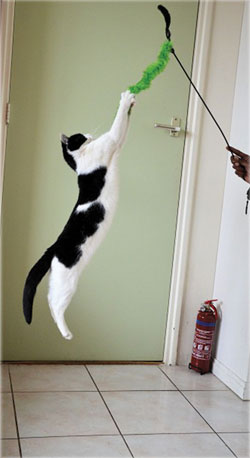Annual Wellness Exam
The single most important resolution you can make for your cat or dog is an appointment with your veterinarian for a wellness exam. This exam should be performed yearly. Obtaining a detailed history from you and performing a careful physical exam can help a skilled veterinarian detect any early warning signs or changes in your pet’s health. In fact, given the short life spans of our companion animals, these exams should be performed twice a year for our senior pets.
Many veterinarians will start recommending routine annual lab work for their senior patients. Having a baseline of normal lab values can be extremely helpful to the veterinarian as the pet ages. This baseline allows the doctor to spot trends over time in the pet’s health, which can lead to early intervention and help the pet live a longer and healthier life.
Vaccinations

Dogs and cats require another core vaccine, commonly known as canine or feline “distemper.” Interestingly, this vaccine actually protects the animal from multiple diseases beyond the namesake “distemper.” Depending on the brand of vaccine used in a given practice, this vaccine may help to protect against three to five different diseases. If you are curious, ask your veterinarian which diseases their “distemper” vaccine covers, but more importantly, make sure that your pet gets its vaccinations and is protected against these preventable diseases. Additionally, there are other vaccines available that may be recommended for your pet based on his or her lifestyle and risk of exposure.
Exercise
Dogs love a daily walk (or more!). Playing fetch with an appropriate toy or playing with other dogs at a dog park can be beneficial as well. Remember that pets need to train just like humans. If your dog has never been regularly exercised, do not expect him or her to join you on your daily jog immediately. Make sure you start small and increase the frequency and duration of sessions appropriately. Be especially mindful of senior pets who may tire out more frequently than they once did; daily exercise is still very important for them, too, just on a more limited basis.
Nutrition
Just as you may make a New Year’s Resolution to eat healthier foods, make sure that your pet’s diet is healthy as well. Feed it a high quality balanced pet food. If you are unsure what would be an appropriate diet and amount, contact your veterinarian for guidelines.
Our feline friends benefit from a wet food diet as this increases their hydration and tends to prevent the obesity often seen with cats on a dry food diet. Dogs can be fed either wet or dry dog food, but they will benefit from healthy snacks – carrots, apple slices (no seeds), or green beans. These low calorie snacks can be offered as rewards and will help your canine companion to feel fuller between meals.
Dental Health
We in veterinary medicine are beginning to recognize more and more the importance of oral health with the overall health and wellbeing of our companion animals. The single most important act for maintaining your pet’s oral health is daily tooth brushing. Special pet-sized toothbrushes can be found at a local pet store. With patience and practice, you can brush your pet’s teeth daily and help him or her to maintain oral health. Routine teeth cleaning by a veterinarian is often a regular part of your pet’s medical needs as they age. Daily tooth brushing can prolong the periods of time between these necessary dental procedures.
Enrichment
Remember that all work and no play can make Fido and Fluffy very dull pets! It is very important to remember to enjoy your pets, have fun with them, include them with the family whenever possible. Animals crave our attention and companionship, too.
Our bond goes both ways. Recent studies have shown that pet ownership actually helps to improve the human owner’s overall health. Be sure to give those health benefits back to your pets, too. Schedule annual wellness exams with your veterinarian, vaccinate your pets, exercise together, brush your own teeth and theirs, and most importantly, enjoy life together! Happy New Year!
•••
Courtesy of the Capitol Veterinary Hospital. Website: capitolaveterinaryhospital.com